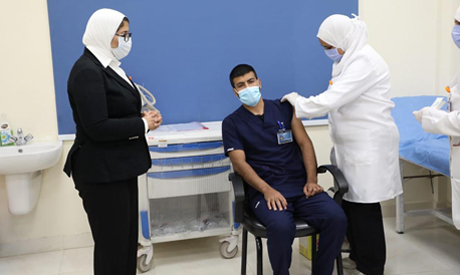
Zayed watches on as some doctors get vaccinated
Members of the medical staff of Abu Khalifa Quarantine Hospital in Ismailia governorate were the first to get the Covid-19 vaccine in Egypt.
The vaccine is produced by the China National Pharmaceutical Group Sinopharm.
Hala Zayed, the minister of health and population, on Monday witnessed the vaccination of 87 doctors out of 200 in the hospital.
The following day, the Chinese vaccine was distributed to all the country’s public hospitals and those affiliated to the military and the police.
Doctors and medical staff dealing with Covid-19 patients will top the list of those getting the vaccine during the coming period and will be getting it for free, Zayed said during a press conference at Abu Khalifa Hospital. This will be followed by other patients, people with chronic or immune diseases and the elderly. The cost of the two-dose vaccine will be LE200 whereas those who cannot afford it will get it for free.
All those who receive financial aid from the Social Solidarity Ministry will take the vaccine free of charge. Others who cannot afford the vaccine and do not receive any financial aid from the government will have to register at their nearest public hospital to get it for free if they are proven eligible, said Zayed.
“Our target is to vaccinate at least 20 per cent of the country’s 100 million citizens,” she added. Youths less than 18 and pregnant women will not be vaccinated by the Sinopharm vaccine until after it is deemed safe by the World Health Organisation (WHO).
The current 50,000 available doses of the vaccine will be sufficient for 25,000 people.
Meanwhile, the government has agreed to buy around 100 million doses of the vaccine by various producers that would be enough for 50 million people, Khaled Megahed, the spokesman for the Ministry of Health and Population, pointed out.
According to Zayed, the government has already secured 40 million doses of the Pfizer/BioNTech vaccine, enough for 20 million people and a further 20 million doses of the AstraZeneca vaccine. The delivery timeline remains unclear because of high global demand, Zayed said.
“Being vaccinated is not compulsory even for doctors and healthcare workers. Two weeks ago, the ministry distributed an application to those who are eligible for the vaccine to decide whether to take it or not,” said Megahed. “The vaccine is 100 per cent safe, as clinical trials have proven its effectiveness in producing antibodies. It is between 89 per cent and 99 per cent effective in protecting from infection, and provides 100 per cent protection against the disease’s aggressive and critical symptoms,” he added.
Megahed noted that Egypt received the first batch of the Sinopharm vaccine during the first week of December. During the same month, the vaccine, which has been registered at the Egyptian Drug Authority (EDA), was licensed for emergency use after undergoing four tests by the authority. “More vaccines will be registered as soon as they reach the country,” he added.
Soon, citizens can start registering on the ministry’s website http://mohpegypt.com/ or at their nearest hospital to get the jab. People will be able to receive the vaccine via 27 centres nationwide.
“As soon as citizens register, they will take their turn. But you cannot set a timeframe for when this will happen, and even the countries that have set a timeframe have not been able to fulfil it, not because they have a problem but because of the global production issue,” Zayed said.
Egypt has reported more than 161,140 confirmed cases of the coronavirus, including 8,902 deaths. However, the actual numbers are thought to be far higher, in part due to limited testing.
*A version of this article appears in print in the 28 January, 2021 edition of Al-Ahram Weekly.
Short link: